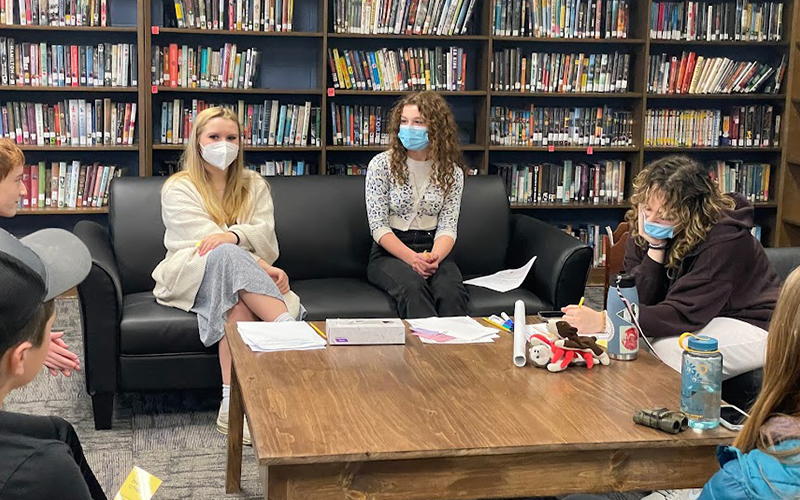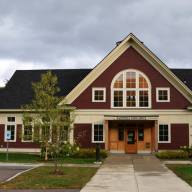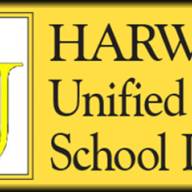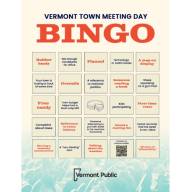The Harkness Student Driven Approach to Learning has become a cornerstone of classroom teaching at Harwood Union, including in the middle school where the power skills of the practice are developed and honed. Power skills include learning to speak in turn, how to respectfully disagree, using non-verbal cues to further discussions and connections, and using sentence stems to help smoothly enter Harkness discussions.
Harkness discussions are grounded in text analysis. The process ensures full participation, and the academic discourse is led by students. With trained students, the instructor becomes an observer who watches, records interactions between students, and summarizes the content of student conversations. With less-experienced students, the teachers take more of a leadership role, with the aim of gradually turning the reins over to students. The structure of the Harkness Method ensures that the conversations are not dominated by a few talkative students, and that controversial discourse does not unravel into argument. This method teaches students how to learn in a way in which they are not just simply sitting and taking in instruction; but rather, they are required to listen, observe, analyze, verbalize, question and provide visual descriptions that lead to further the understanding of everyone at the Harkness table.
Over the past several years, under the guidance and direction of former teacher Kathy Cadwell, educators at HU have been participating in a Professional Learning Community (PLC) Cohort where teachers can share methods, materials, and ideas for honing the Harkness practice in their classrooms. Social studies teacher Adam Sargeant and English teacher Kate Stauss are the leaders of the PLC, planning the after-school sessions, and coordinating the student-led teacher discussions.
This year Stauss is teaching a course called “Harkness Leadership” an English elective for students in grades 10-12. The student leaders in her class are skilled Harkness facilitators whose expertise caught the attention of Cadwell. Cadwell pioneered the Harkness practice at Harwood, and this year connected the Harwood Harkness leaders to opportunities extending beyond the school. Cadwell approached Stauss about taking the group on tour to share their insights and experiences with Harkness with other schools around the state.
The Harwood Harkness Leaders are: Mikey Casey, Arianna Clark, Rowan Clough, Ella Dice, Maisie Franke, Ellie Hammond, Maya Hynes, Carmen Lafayette, Ben Larson, Abigail Leighty, Hazel Lillis, Mae Murphy, Quinn Nelson, Anabelle Reisner and Lucy Sullivan. Several of the Harwood representatives visited three other schools this year: Champlain Valley Union in March, Hazen Union in April, and Mount Abraham Union in May. All three of these opportunities came at the invitation of teachers who were interested in finding out more about student driven inquiry and the Harkness pedagogy.
At Hazen, Stauss and her students worked with middle and high school students, teaching the power skills that create civil dialogue. Harkness leaders demonstrated a Harkness dialogue in front of the Hazen faculty and they were inspired by the civility, deep insights, commitment to text, thoughtful questioning and collaborative discussion of the Harkness Leaders, according to spokesperson Jacki McCarthy.
Harwood principal Laurie Greenberg noted that student voice is a priority at Harwood, making Harkness is a natural fit for our broader school goals.
Harkness student leaders shared their reflections on the experience of touring the state and providing instruction to peers as well as professional educators. Junior Ellie Hammond explained that the experience teaching the Harkness Method at other schools, “opened up my perspective about what it’s like to teach, and what it is like to learn.”
Overall, the experience was overwhelmingly positive for students and teachers, participants said. “Harkness has helped me develop a lot of skills that I can use in and outside of the classroom,” commented Harwood junior Ella Dice, “and it has also helped me navigate conversations about difficult topics like racism, or environmental racism. Harkness has helped me develop the skills I need to have these conversations. Harkness taught me how to ask questions.” Sophomore Hazel Lillis added, “Harkness discussions have taught me how to connect with people who have perspectives that are different from my own.”














